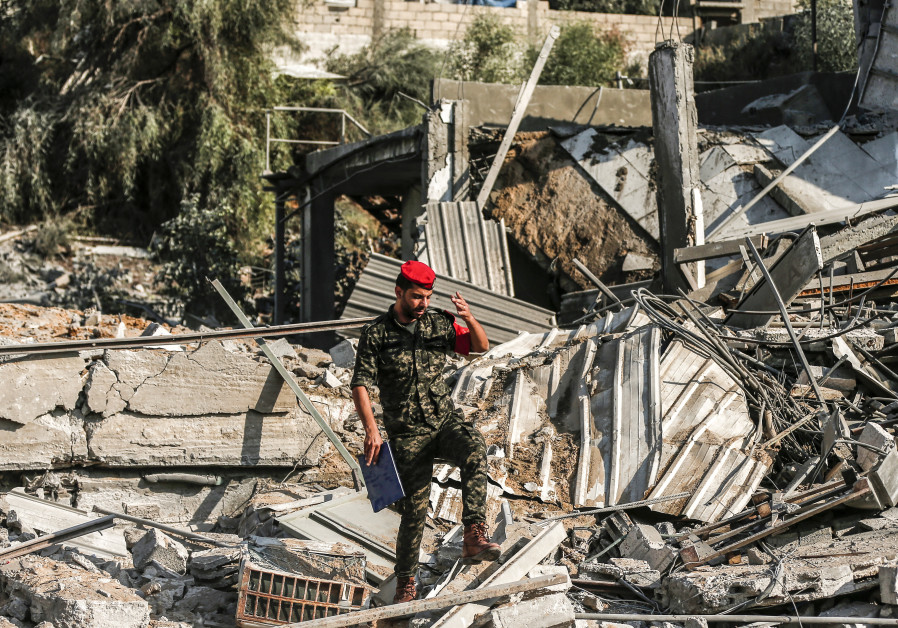Former US envoy: A military defeat of Hamas now is bad for Israel

A member of Hamas’ military police walks through rubble at a site that was hit by Israeli air strikes in Gaza City on August 9, 2018. (photo credit: MAHMUD HAMS / AFP)
An Israeli military victory in Gaza is a loss for Israel because it would either have to rule the enclave or risk a more radicalized group like ISIS taking over, former US negotiator Dennis.
Ross told The Jerusalem Post, adding that an extended period of calm at this point is the best outcome for both Israel and Hamas.
Ross spoke with the Post on the sidelines of the third annual Track II Environmental Forum Conference in Kibbutz Ketura, just an hour or so before Israel announced that it planned to refrain from embarking on another Gaza war.
Israel has the military might to defeat Gaza, Ross said, but the question is what happens when it does.
“Then what?” he asked. Israel doesn’t want to own or rule Gaza, nor can it hand it to the Palestinian Authority after a military defeat.
“I do not think the PA wants to look like they came in on the back of Israeli tanks. I am not even sure how you would do it, practically speaking,” Ross said.
Israel is the only force powerful enough to police the area and ensure that it is not taken over by a group more radicalized than Hamas, but again the PA would not want to govern an area whose security is ensured by Israel, he said.
“What I worry about is, if you [Israel] go back in, you are stuck there, because if you leave, then there is a [power] vacuum,” Ross said.
“Who fills the vacuum? You have Islamic Jihad, some ISIS-kind of groups” that could take over, he speculated.
“It’s a no-win scenario” for Israel, he said, adding that Hamas, like Israel, does not want to see such an outcome.
“The irony is that both sides have good reason not to want this to become a war,” he said.
Hamas is equally afraid of a more radicalized group taking over Gaza so it runs a high risk if it engages in an all-out military confrontation with the IDF, he said.
It is for this reason, he said, that in spite of the intensity of the exchange of fire between Hamas and Israel in the last two days, both sides left room for Egypt and the UN Special Coordinator for the Middle East Peace Process Nickolay Mladenov to continue to mediate an extended period of calm.
“Hamas has expanded the area of its targets, but there still is a limitation of what they are firing at, which still looks as if they are trying to keep things within certain bounds,” he said.
Israeli targets are qualitatively different that in past military engagements and the casualties are small, he said.
The limitation appears to be a deliberate signal that both sides would prefer a non-military resolution.
Egypt and Mladenov, he said, have a phased plan that involves immediate humanitarian relief, such as the Qatari-funded fuel and the $15 million for civil servant salaries.
Then one needs to deal with the problems relating to sewage treatment and clean water in Gaza, he said. There is also a need to tackle reconstruction and the high unemployment in Gaza.
A formula for an extended period of calm is a necessity, he said, because violent exchanges run the risk of provoking a new war.
A Gaza war also has an impact on the West Bank because it gives the Palestinians there, who might otherwise oppose Hamas, a reason to support the group.
Sustained calm can also create a space for other options to be created that do not exist at this time, Ross said.
There are few options here at this time given that “you are not going to have peace with Hamas any time soon” and a two-state solution to the conflict is still far away from any resolution.
He said he has not seen the Trump peace plan, although he has spoken with US envoys Jason Greenblatt and Jared Kushner.
But, Ross speculated that in the best-case scenario, the plan would spark substantive negotiations, but that a lengthy process for concluding a deal was needed.
“If you want anything to happen on the peace issues itself more broadly speaking, you cannot have Gaza blowing up,” he said.
Join Jerusalem Post Premium Plus now for just $5 and upgrade your experience with an ads-free website and exclusive content. Click here>>






Comments are closed.